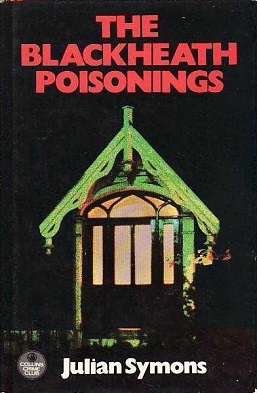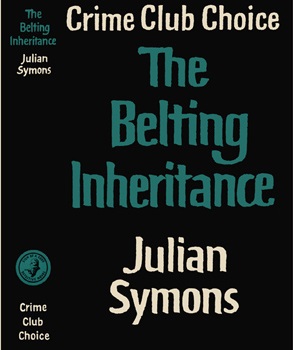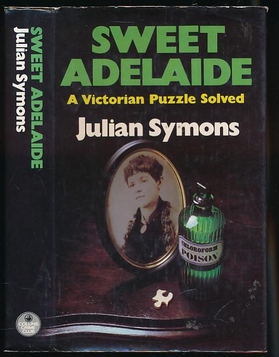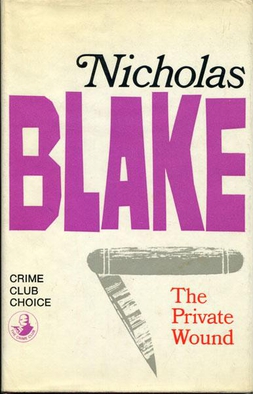
Ellery Queen is a pseudonym created in 1928 by the American detective fiction writers Frederic Dannay (1905–1982) and Manfred Bennington Lee (1905–1971). It is also the name of their main fictional detective, a mystery writer in New York City who helps his police inspector father solve baffling murder cases. From 1929 to 1971, Dannay and Lee wrote around forty novels and short story collections in which Ellery Queen appears as a character.

The Edgar Allan Poe Awards, popularly called the Edgars, are presented every year by the Mystery Writers of America which is based in New York City. Named after American writer Edgar Allan Poe (1809–1849), a pioneer in the genre, the awards honor the best in mystery fiction, non-fiction, television, film, and theater published or produced in the previous year.
Michael Francis Gilbert was an English solicitor and author of crime fiction.
Margaret Ellis Millar was a Canadian-American mystery and suspense writer.
Julian Gustave Symons was a British crime writer and poet. He also wrote social and military history, biography and studies of literature. He was born in Clapham, London, and died in Walmer, Kent.

The Golden Age of Detective Fiction was an era of classic murder mystery novels of similar patterns and styles, predominantly in the 1920s and 1930s. The Golden Age proper is in practice usually taken to refer to a type of fiction which was predominant in the 1920s and 1930s but had been written since at least 1911 and is still being written.

The Narrowing Circle is a 1954 mystery crime novel by the British writer Julian Symons. The title refers to the "narrowing circle" the investigating policemen throw around the most likely suspect.

The Man Who Killed Himself is a 1967 comedy crime novel by the British writer Julian Symons.

A Three-Pipe Problem is a 1975 mystery detective novel by the British writer Julian Symons. A pastiche of the original Sherlock Holmes stories by Arthur Conan Doyle, it takes place in the present day. The title refers to a line spoken in The Red-Headed League, referring to a particularly tricky problem that will take Holmes the time it takes to smoke three pipes to solve. It was followed by a sequel The Kentish Manor Murders.

The Blackheath Poisonings is a 1978 historical mystery novel by the British writer Julian Symons. It is a murder mystery set in the late Victorian era.

The Belting Inheritance is a 1965 mystery detective novel by the British writer Julian Symons. It is a traditional country house mystery harking back towards the Golden Age of Detective Fiction. It was republished by British Library Publishing in 2018 along with another Symons novel The Colour of Murder.

The Colour of Murder is a 1957 crime novel by the British writer Julian Symons. It was awarded the Gold Dagger of the Crime Writers' Association for that year. It was republished by British Library Publishing in 2018 along with another Symons novel The Belting Inheritance.

The End of Solomon Grundy is a 1964 crime novel by the British writer Julian Symons. The title refers to a line in the nursery rhyme Solomon Grundy.

Sweet Adelaide is a 1980 historical crime novel by the British writer Julian Symons. It is based on the real-life 1886 Pimlico Mystery concerning the possible murder of Thomas Bartlett by his wife Adelaide. Symons had already enjoyed success with another Victorian-set mystery The Blackheath Poisonings.

A Man Called Jones is a 1947 mystery detective novel by British writer Julian Symons. It is the second novel in his trilogy featuring the Scotland Yard detective Chief Inspector Bland. Symons was critical of the "Great Detective" that features in so many novels during the Golden Age of Detective Fiction and demonstrates this in the climatic scene where Bland assembles all the suspects to explain his theory, only to first send them to sleep and then be confronted by the late arrival of a previously unknown character on which the whole puzzle hinges.

Bland Beginning is a 1949 mystery detective novel by British writer Julian Symons. It is the third and final novel in his trilogy featuring the Scotland Yard detective Chief Inspector Bland. It features Bland before he became a policeman, becoming involved in his first ever case.

The 31st of February is a 1950 mystery crime novel by British writer Julian Symons. It was his fourth published novel following a trilogy featuring Chief Inspector Bland. It further continued the author's toying with the Great Detective type of the classic model during the Golden Age of Detective Fiction. The investigating officer in a potential murder case, Inspector Cresse, is far from flattering portrayed.

The Paper Chase is a 1956 mystery crime novel by the British writer Julian Symons. It was published in America the following year by Harper & Brothers under the alternative title of Bogue's Fortune. It was reviewed by fellow writers Milward Kennedy in The Guardian and Philip John Stead in the Times Literary Supplement.

The Plot Against Roger Rider is a 1973 mystery thriller novel by the British writer Julian Symons. The novel takes place both in England and Francoist Spain. It was published in the United States by Harper.

The Private Wound is a 1968 mystery thriller novel by Cecil Day-Lewis, written under the pen name of Nicholas Blake. It was one of four stand-alone novels he wrote alongside the Nigel Strangeways detective novels. The title is taken from a line in William Shakespeare's Two Gentlemen of Verona. It was a runner-up for the Gold Dagger Award of the British Crime Writers' Association.

















